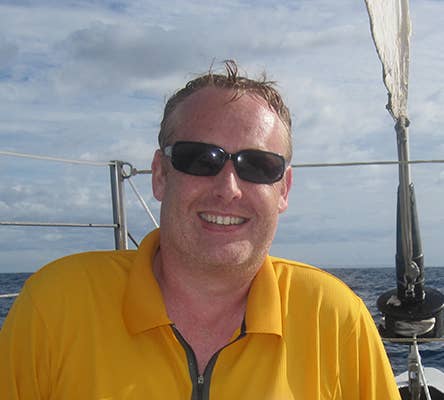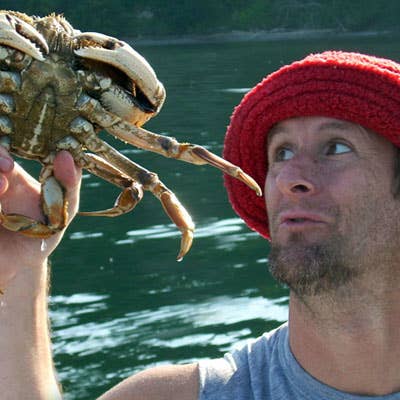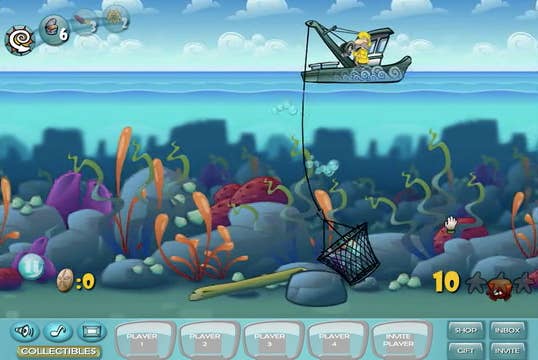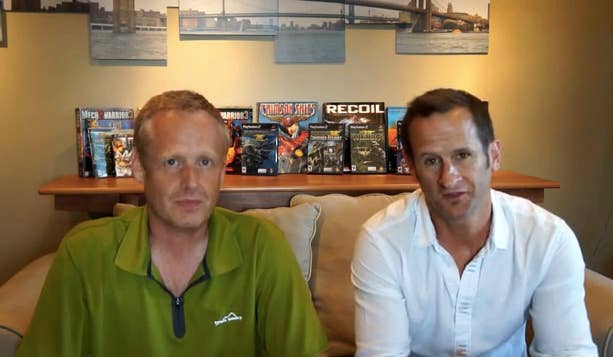SOCOM vets: "The power packed into today's tablet is amazing"
We speak with nobodinos founders David Kern and Russ Phillips about the transition from consoles to mobile
Last week, Zipper Interactive veterans David Kern and Russ Phillips announced their new development studio, nobodinos. When Sony shut down the SOCOM developer, Kern and Phillips were quick to take action, and unsurprisingly, the duo is now chasing the mobile and casual market.
The story is one that's all too familiar nowadays. The triple-A console market is becoming increasingly difficult to survive in and many talented designers and programmers are taking their skills to the still booming mobile sector.
In this exclusive interview with GamesIndustry International, Kern and Phillips talk about the process of getting their studio running, the transition from consoles to mobile and casual, and what the future might hold for the company and industry at large.
The triple-A console market will never go away; it's just changing. We'll see fewer big titles competing for the same space because the risk has grown and funding is harder to get. Showing results is paramount. Striving to stay a triple-A title forces you to keep ahead of the game with constantly changing technology and keeping up with the capabilities of the console you are developing for. To win, you have to be on top of all the tech possible, primarily driven by graphics power, but also the expectation of state of the art and animation including perfect motion-capture, perfect lip sync and facial animation - just like feature films.

On one hand, publishers are scared to try new franchises because of the risk and huge cost, but also because the talent required for these types of titles is very expensive. More than just your dev team of engineers, artists and designer - we're talking about actors, voice talent and orchestral musical scores and the list goes on. Most people don't know that teams are actually sent on photo and audio source gathering trips to remote locations or to places in the desert to record weapon and explosion sounds. External studios are contracted specifically to scan heads and motion capture cinematic scenes.
"We're not saying greed takes over, but we truly believe a big company cannot run as smoothly and as flexible as a smaller group of very passionate, creative people can"
Russ Phillips
All of this is great to be involved in, but the complexity is mind boggling and requires a herculean effort to pull together into a shippable product. However, it contributes to the ultimate realism of the finished product. We thank our supporters and understand our doubters. The experience of Zipper has helped us to understand the industry and was a great time in our lives. Toward the end it has also made us aware of the ever-changing video game entertainment market. We are now opening the first chapter in a new book. Don't judge us until we really get rolling.
First, we are passionate about making fun entertainment so where that entertainment takes place does not matter so much. We have an awesome concept for a casual game with Bottom Feeders and are running with it. It doesn't preclude us from doing anything else with the company. Our goal is not just one mobile game. The casual and mobile markets simply offer a quicker path for a small team to get a game to the market, especially a company which is bootstrapping all their funds. The casual and mobile market allows you to try ideas and get immediate feedback so we can understand what the trends are now and meet the goals of the changing market. We are new to this type of development, but we are looking forward to the change.

We have other projects as well and may indeed do something for the console again. In fact, we just finished an interesting project with Lion Works studio out of Guatemala. It was a quick turnaround project to polish a demo for them that involved a lot of 3D modeling, level assembly and lighting. These kinds of projects keep us versatile and we continue to keep an open mind about all of this.

Some of our best memories of building the SOCOM franchise were the early years of development. Looking back at our team of no more than about 35 people really made the difference. We worked long hours and in some cases slept at the studio because we had that passion. When a company grows to 100+ employees, you get excited because you feel the growth and feel like you've really hit it big, but somewhere in there things change. There are more people involved in simple decisions, there are more people vying for position because there is a ton of money to be made. We're not saying greed takes over, but we truly believe a big company cannot run as smoothly and as flexible as a smaller group of very passionate, creative people can.
Nobodinos hit the ground running very soon after Zipper was shut down and have not had a day off since and already have so much to show for it. Our Beta was a big hit and we get emails every day asking when we will have it back up. At a small company you have to wear many hats, which makes it a lot of fun. The most difficult part has been splitting time building the company vs. building the product. I'm the Art Director, Game Designer and Artist. David is the Business Manager and Game Engine Developer and everything else in between. We have a strong team of experienced professionals that are also very diverse in their individual abilities.
Everybody has to pull their weight and be flexible. Everybody contributes to the game design because as much as you try to pre-plan everything, once you get a chance to play your game and see it on the screen, many things change. This is a great example of how we, as a small company, stay flexible and can make changes in an instant - this is a big change in development and it's the best part!
We strive to meet the needs for all gamers and, although this is our first game, it won't be our last. The company isn't called Bottom Feeders.... it's nobodinos and we plan to be around for a while. We are 100% ok with making games… for another audience? We'll see about that - we played a lot of SOCOM and we've always loved games like Angry Birds, Cut the Rope and Plants vs. Zombies. It's pure entertainment and we feel a game like Bottom Feeders can reach a very wide audience when it's released.
As we are finding out, the cost of entry is not as low as we had hoped. When is it ever? A good game still takes hours and hours of iteration. Two guys can do it in the garage but it better be heated for winter and cooled for summer. Our strategy is get our first game to the point that it is fun and has enough depth to make it appealing to a very wide audience. Then we will launch, buy advertising, add content, start the next title, push to more platforms, buy advertising, launch the next title and so the lifecycle goes. At the same time, we incubate other ideas and start creating the next game sensation - casual, mobile or otherwise.
"We...especially intend to go after the tablet market. The power packed into today's tablet is amazing"
David Kern
We do agree and especially intend to go after the tablet market. The power packed into today's tablet is amazing. Our next game will be 3D and take full advantage of what they can do. While there is a huge market for the console games, many young or beginner devs have more flexibility and access with the mobile space.
There will always be games that require full concentration and a big screen to enjoy them. The mobile market is competing for market share, just as computers have stolen from the newspaper and television market. The beauty is that there are new users along with this market and plenty of room to do it all. We can even see a time in the near future where the mobile tablet in your hands "is the console" and happens to be a controller too. The possibilities are endless.
We have some flexibility that the larger, public companies don't. They have to watch their stock prices, compliance, and more - the fast growth can take its toll. They have good products and we hope they bounce back as a result. For us at nobodinos, we want to keep it simple. We just want to make great, fun games. We want to grow but understand the economy may impact us so that slow growth can be our advantage. Maybe we can leverage the opportunity to create and support games in the casual market while slowly growing and investing to help fund some of our larger efforts.
Yes, that's always a possibility. We feel however that games, particularly for the console, "live" areas are typically very different than the casual games - they're kind of half way in between. We do have some ideas in mind for those types of platforms. Our goal is to show very compelling demos of a level with most of the main features working and drive interest and funding via results.
Be prepared to work harder than you have before for less income. Get back to the reason you want to be in the industry. For us it is because we enjoy the work and have fun. It is very satisfying to watch someone play your games and see the smiles and intensity and hear the exclamations of defeat followed by success. At nobodinos we are dedicated to make great games that we believe in. We enjoy innovation and have a passion for creativity. We get joy from the cool art we can make and get satisfaction from a working algorithm. We enjoy making tools for ourselves that save time. We believe quality is proportional to how fast we can iterate and find an answer. In the end, working at nobodinos is just plain fun.









